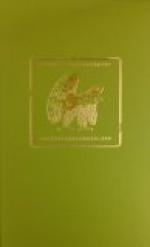Snowshoes were a necessity, and the demand at the little station had long exceeded the supply, but the operator was able to furnish the length of bale rope Tisdale asked of him. From the office door, where he had curiously followed to see the line put to use, he watched the traveler secure two pliable branches of hemlock, of the same size, which he brought to the station platform, and, having stripped them of needles, bent into ovals. Then, laying aside one, he commenced to weave half of the rope net-wise, filling the space in the frame he held. A sudden intelligence leaped in the agent’s face. “That’s simple enough,” he exclaimed. “And they’ll carry you as far as you want to go.”
Tisdale smiled, nodding, and picked up the remaining frame.
“Strange I never saw any one try the scheme before,” the operator commented. “I’ve weathered a good many blockades up here; seen lots of fellows, men whose time was money, bucking it out to open track. But I bet the first time this idea struck you you were up against it. I bet it’s a yarn worth listening to.”
Tisdale glanced up; the genial lines deepened. “It was a situation to clear a man’s head. There was snow from three to seven feet deep ahead of me and going soft. My snowshoes, lost with the outfit at a hole in a Yukon crossing, were swinging down-stream under the ice. I had two sea biscuit in my pocket and a few inches of dried venison, with the nearest road-house over fifty miles away.”
“Well, that was hard luck,” the agent shook his head gravely.
“It was the best kind of luck,” responded Tisdale quickly, “to find myself with that rope in my hands and a nice little spruce on the bank to supply frames enough for a regiment. I was rigging a kind of derrick to ease my sled up the sharp pitch from the crossing.”
“I see,” said the operator thoughtfully, “and the sled broke through. Lost it and the outfit. But your dogs—saved them, didn’t you?”
“All but two.” Tisdale’s brows contracted. “They were dragged under the ice before I could cut the traces. There was leather enough on the leaders to bind those shoes on, but”—and the humorous lines deepened again—“a couple of straps, from an old suitcase, if you happen to have one, would be an improvement.”
The operator hurried into the office and, after a vigorous search among the miscellaneous articles stored under his desk, found an old valise, from which he detached the desired straps. Tisdale adjusted the improvised shoes. “I will send them back by a brakeman from Scenic Springs,” he said, rising from his seat on the edge of the platform. “You can keep them for a pattern.”
“All right,” the operator laughed. “If you do, I’ll have to lay in a stock of bale rope.”




